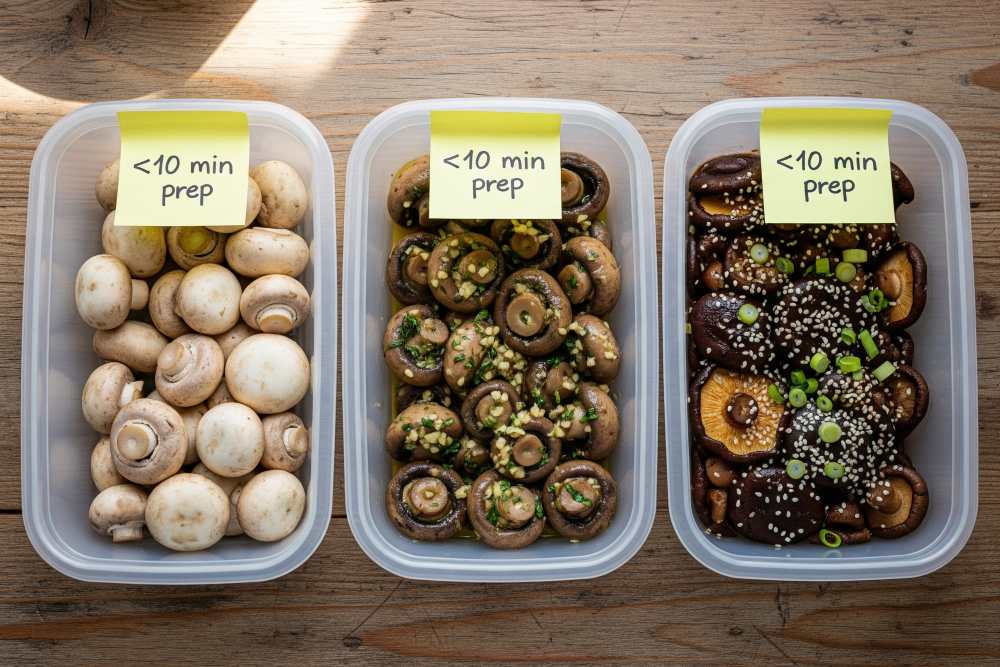In a world where gut health is increasingly in the spotlight, many people are turning to the Low FODMAP diet to manage digestive discomfort. If you’re one of them, you’ve probably found yourself constantly searching for foods and drinks that won’t upset your stomach.
Coffee often poses a challenge due to its potential to trigger digestive issues.
For those on a Low FODMAP diet, mushroom coffee might be the solution you’ve been searching for.
This drink combines the comforting ritual of coffee with the potential gut-friendly properties of medicinal mushrooms.
Understanding the Low FODMAP Diet
The Low FODMAP diet is a scientifically backed approach designed to help people with Irritable Bowel Syndrome (IBS) and other digestive issues. By reducing certain types of carbohydrates that are poorly absorbed in the gut, this diet can significantly reduce symptoms like bloating, gas, and stomach pain.
Here’s a breakdown of what you need to know:
What are FODMAPs?
FODMAPs, or fermentable oligo- and di-saccharides, monosaccharides, and polyols, are carbohydrates that can trigger digestive symptoms in people with IBS.
These carbs are found in certain fruits, vegetables, dairy products, and sweeteners.
How does the Low FODMAP Diet work?
The diet involves eliminating high-FODMAP foods for a period of time, then gradually reintroducing them to identify which ones trigger symptoms.
This method helps personalize the diet, allowing individuals to enjoy a broader range of foods without discomfort.
Why do Beverage Choices Matter?
Like foods, Drinks can also be high in FODMAPs, and choosing the wrong ones can lead to unwanted symptoms.
Popular beverages, like regular coffee, fruit juices, and certain teas, may contain high levels of FODMAPs, making it crucial to find suitable alternatives.

The Low FODMAP diet isn’t just about avoiding certain foods—it’s about making informed choices for better digestive health. This is where mushroom coffee becomes particularly important.
What Determines Mushroom Coffee as Low on FODMAP?
It requires a closer look at its key components—mushrooms and the coffee base.
Let’s break it down:
Mushroom ingredients
Chaga, Reishi, and Lion’s Mane: These mushrooms are generally low in FODMAPs. They are safer options for those with sensitive digestion.
Cordyceps: Typically low in FODMAPs as well, Cordyceps is less likely to cause digestive issues if not taken in large amounts.
Concentration Matters: The amount of mushroom extract in mushroom coffee is usually low, so the risks of FODMAP-related problems are low.

Coffee Base
Regular Coffee: Coffee is low in FODMAPs but can sometimes trigger symptoms like acid reflux or stomach discomfort due to its acidity and caffeine content.
Decaf Coffee: Decaffeinated coffee is also low in FODMAPs and might be a gentler option for those sensitive to caffeine.
Mushroom Coffee a Low FODMAP or Not?
Monash University, a leading authority on the Low FODMAP diet, has conducted extensive research on the FODMAP content of various foods.
But Mushroom Coffee hasn’t specifically been tested for its FODMAP content. However, certain mushrooms used in these beverages, such as Reishi and Lion’s Mane, are generally low in FODMAPs.
It’s advisable to follow Monash University’s resources or their FODMAP Diet App for the most accurate and up-to-date information.
Why Choose Mushroom Coffee on a Low FODMAP Diet?
Mushroom coffee can be a smart choice for individuals following a Low FODMAP diet due to its unique composition and potential digestive benefits.

Here’s why it stands out:
Low FODMAP-Friendly Ingredients
Medicinal mushrooms like Lion’s Mane, Chaga, and Reishi are naturally low in FODMAPs, unlike common high-FODMAP foods such as button mushrooms or certain legumes. This makes them suitable for sensitive digestive systems.
Gentler on the Stomach Compared to Regular Coffee
Regular coffee, though Low FODMAP, can irritate the gut due to its acidity and high caffeine content, which may trigger symptoms like acid reflux or stomach discomfort. Mushroom coffee often contains less caffeine and is less acidic, making it a gentler alternative. It also decreases stress induced cravings or overeating. It gives you a better appetite control and weight management.

Adaptogens for Digestive Stress
The adaptogenic properties of mushrooms help the body manage stress, which can be a trigger for digestive flare-ups in people with IBS or similar conditions.
Nutritional Advantages
Unlike regular coffee, mushroom coffee offers added nutrients like antioxidants and beta-glucans. It can support gut health by reducing inflammation and promoting a balanced gut environment.
Blends Well with Low FODMAP Diet Goals
A Low FODMAP diet that reduces digestive distress while maintaining essential nutrients is Mushroom coffee. It’s a nourishing, gut-friendly beverage option without the common triggers found in high-FODMAP foods.
Things to consider while buying a Mushroom Coffee blend
Selecting the right mushroom coffee can make a big difference in maintaining a Low FODMAP diet.
Here’s how to make an informed choice:
Read Labels Carefully:
Look for products that clearly list the types of mushrooms used. Stick to those known for being low in FODMAPs.
Be cautious of added ingredients like artificial sweeteners, dairy, or high-FODMAP flavorings, which could trigger digestive issues.
Look for low-FODMAP alternatives like almond milk or maple syrup.
Opt for Trusted Brands:
Choose mushroom coffee from brands that are transparent about their sourcing and processing methods. Brands that focus on quality often provide more reliable Low FODMAP options.
Check reviews to see if others with similar dietary needs have had positive experiences with the product.

DIY Options:
If you prefer more control over your ingredients, consider making your own mushroom coffee. You can combine low-FODMAP instant coffee with mushroom extracts that you trust.
Serving Size Matters:
Even the low-FODMAP mushroom coffee can become a high FODMAP if the serving size is high. So, make sure the serving size is small.

- Additional Considerations:
- Be cautious of any added ingredients to your mushroom coffee, as they may contain FODMAPs.
- For example, milk and sugar are common FODMAP-containing ingredients. Look for low-FODMAP alternatives like almond milk or maple syrup.
- The brewing method can also affect the FODMAP content of mushroom coffee. Experiment with different methods to find what works best for you.
Final Thoughts
Remember, your digestive health is unique, and finding the right balance is key. It can be a suitable choice for some individuals with IBS
Enjoy the process of discovering what works best for your body, and don’t hesitate to consult with a healthcare professional if you have any concerns.








